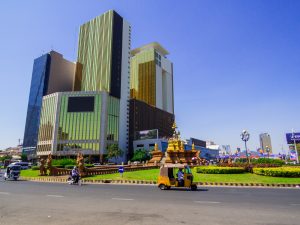Cambodian police yesterday arrested 15 workers taking part in a weeks-long strike against mass lay-offs by the country’s largest casino in the capital Phnom Penh. The strike outside the reflective gold edifice of the NagaWorld Hotel & Entertainment Complex has drawn hundreds of workers since December 18, pressing their demand for the reinstatement of 365 employees fired in April.
Last year, the Hong Kong-listed NagaCorp began the process of laying off 1,329 employees, which it claims was part of a “mutual separation plan” designed to shore up its profits amid the COVID-19 pandemic, according to Reuters.
The Labor Rights Supported Union of NagaWorld Employees (LRSU) and its leader Chhim Sithar, who called the strike after months of negotiations failed to produce a resolution, claim that many of those let go were union members and were not compensated properly. Yesterday’s action also called for the release of nine people arrested at the strike on January 1, who have reportedly since been charged with “incitement to cause serious chaos to social security.”
Chhim Sithar told Radio Free Asia yesterday that the Cambodian authorities were “using the judiciary to arrest union leaders after accusing them of leading unlawful strikes and inciting workers,” and called for NagaCorp to reopen negotiations with the workers.
Since being ruled illegal by a Cambodian court in mid-December, the strike has met with the concerted opposition of the government and its various social media satraps and media cheerleaders. In the days after the strike began last month, anonymous Facebook groups began pushing dubious claims that Sithar and the LRSU had been trained by foreigners to lead the strike against NagaWorld.
The allegations were subsequently covered by the government-aligned media outlet Fresh News, which this week happened to publish advertorial content promoting NagaCorp’s corporate social responsibility “efforts,” while the CPP-friendly Khmer Times took a similarly strong pro-management position on the strike. Heng Sour, a spokesperson for the Ministry of Labor and Vocational Training, even went on the record as saying that pregnant women had been forced to participate in the strike as part of a “color revolution tactic.”
The reference to a “color revolution,” a foreign-directed campaign of mass protests designed to overthrow the ruling Cambodian People’s Party (CPP), has become a staple of Cambodian government discourse in recent years: a cudgel with which to beat down any form of opposition.
Part of the reason is that Cambodian opposition parties and civil society groups have historically drawn moral and material support from foreign governments and international NGOs – a legacy of the multinational democracy building effort instigated by a United Nations peacekeeping mission in the early 1990s – and so there is some benefit for the CPP in anathematizing any connections between foreigners and Cambodians.
The specter of “color revolution” has been used to justify the ongoing treason trial against Kem Sokha, the president of the now banned Cambodia National Rescue Party, the banning of the party in 2017, and an array of repressive actions against the country’s civil society and independent press. Its appearance in connection to a labor dispute also reflects the ruling elite’s paranoia about any potential mobilization of the country’s new industrial working class, which has historically enjoyed close links to the Cambodian opposition.
The NagaWorld arrests, and the hostile official reaction to the strike more generally, suggests that, having squeezed most formal sources of opposition out of existence, the government will continue to paint any mass social movement, whether for democratic rights or better working conditions, as a project of foreign interests.
































